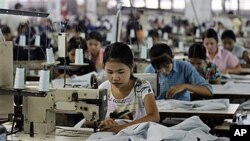Burma has made progress since the formation of its new government in the spring of 2011. The beginning of a transition to civilian rule from a military-dominated system, holding of a more inclusive and credible Parliamentary by-election this April, the easing of some media restrictions and the freeing of more than 500 imprisoned political activists were important steps in the nation’s democratic transformation, and a sign that Burmese leaders have embarked on a path of greater openness, transparency and reform.
Over this period, the United States has continued and strengthened its policy of principled engagement with the Southeast Asian nation, taking positive actions to benefit the Burmese people when government reforms are made and encouraging leaders to press ahead with further reforms.
In further response to the historic changes that have taken place in Burma over the last year, President Barack Obama announced July 11 that the United States had decided to ease core financial and investment sanctions previously imposed on it, allowing U.S. companies to invest in the country for the first time in nearly 15 years. The participation of American businesses in the Burmese economy has the potential to set a model for responsible investment and business operations, as well as encourage further change, promote economic development and contribute to the welfare of the Burmese people.
While the move represents an easing of important restrictions imposed on the Burmese government, underlying sanctions authorities remain in place. The president has also signed a new executive order expanding the ability of the U.S. government to target sanctions against those individuals who violate human rights or threaten the peace, security and stability of Burma.
Further, U.S. business interests won’t be allowed to invest in entities owned by Burma’s Ministry of Defense or other state or non-state armed groups. Investors also will be required annually to file detailed, public reports on their activities as a way to promote greater transparency and encourage civil society there to partner with our companies toward responsible investment.
Meanwhile, we will continue to press for further progress in democratization, a halt to hostilities in ethnic minority areas, the unconditional release of political prisoners and a cessation of Burma’s military trade with North Korea.













